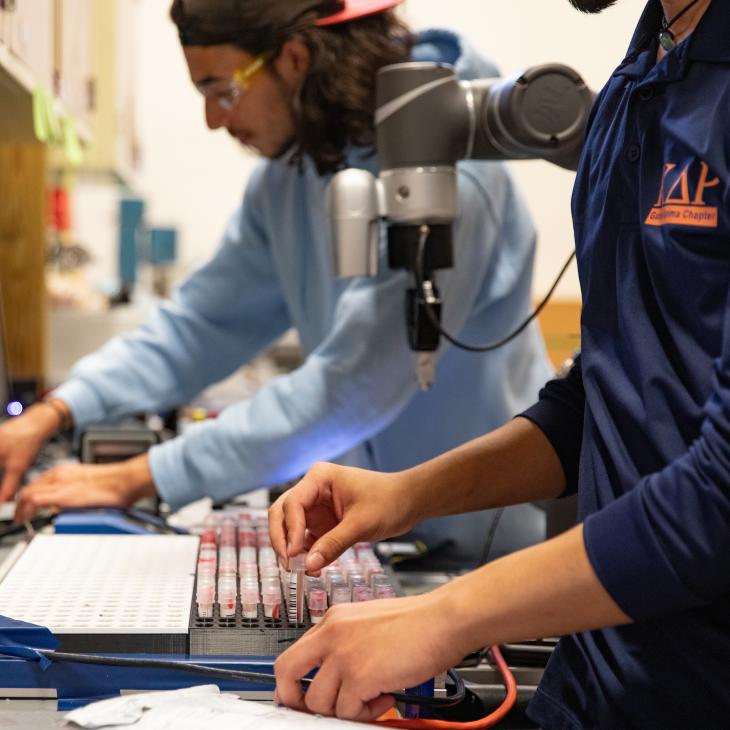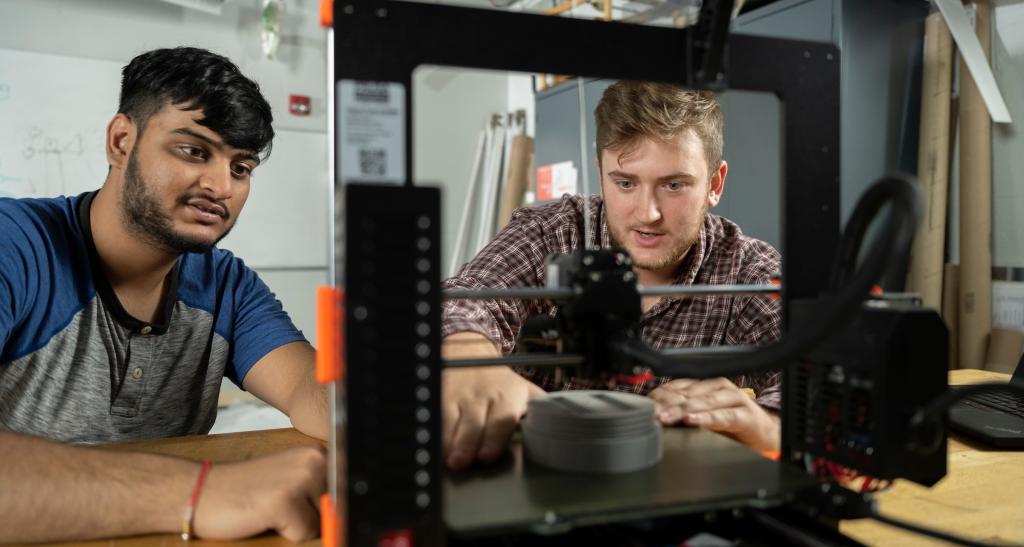
Get paid as you gain professional experience.
Through the Engineering Co-Op Program in the Kinsley School of Engineering, Sciences and Technology, you'll gain practical hands-on experience with industry employers. You'll graduate with a wealth of real-world engineering experience — and many of our students go on to find employment with their co-op host company after completing their degree.
After your first two years of coursework, you will complete two alternating semesters of co-ops. These are typically paid work experiences, with students acting as temporary employees for industry partners. Through the co-op process, you'll develop job-searching skills by identifying, applying for, and interviewing for co-op positions with companies in South Central Pennsylvania and nationwide.
Co-Op Opportunities and Benefits
All York College engineering students are required to take two co-op semesters. These experiences provide tremendous value. They prepare students for more advanced coursework, while also offering insights into career options and real-world workplaces.
Connect the Dots
You'll gain a better understanding of the ways your coursework applies to engineering practice.
Professionalism
Co-ops provide opportunities to hone the skill set of a working professional, including interpersonal and communication skills.
Get Paid for Your Work
Earn money with paid co-op positions that help you meet college expenses.
Build Your Network
Learn about your future profession by connecting directly with practicing engineers.
Ready Your Résumé
With two semesters of industry work experience, you'll have an edge in the job market upon graduation.
Receive Meaningful Feedback
You'll receive an evaluation from your co-op supervisor, offering feedback you can use as you move forward in your career.
Student FAQ
| Year | Fall | Spring | Summer |
| 1st Year | Academic Term | Academic Term | * |
| 2nd Year | Academic Term | Academic Term | CO-OP I |
| 3rd Year | Academic Term | CO-OP II | * |
| 4th Year | Academic Term | Academic Term | May Graduation |
*Students have the option to complete experiential learning opportunities.
Computer, Electrical, and Mechanical Engineering students must meet the following requirements:
- You must maintain a GPA of at least 2.5
- You must satisfactorily complete a minimum of 64 credit hours towards your engineering major
Civil, Computer, Electrical, and Mechanical Engineering students must also meet the following requirement:
- Satisfactorily complete EGR 290, Engineering Career Training seminar, a course designed to support the engineering career preparation and improve employment skills.
- Each co-op experience must last a minimum of 12 weeks in the summer and a minimum of 15 weeks in the spring or fall, if applicable
- Vacation time does not count toward the total number of weeks worked
- Work weeks must be full-time (40 hours per week or similar, per company policy)
- Part-time work does not count toward a co-op
While it is your responsibility to find a co-op position, the Engineering Co-op Program Director will assist students in their co-op search by:
- Helping you with resume writing and interview skills
- Posting positions from local employers
- Scheduling on-campus interviews
- Hosting events on campus where you can meet with industry professionals to learn and network
Or you may find your own co-op position. Co-op job descriptions must be approved by the faculty program coordinator.
Prior to obtaining a co-op position, you are responsible for the following:
- Ensuring that you meet all the eligibility requirements for the co-op program.
- Obtaining an appropriate co-op position.
- Registering for each co-op period with the College Registrar and paying the required tuition for co-op credits.
- Completing a resume critique and mock interview with the engineering co-op program director by the deadline.
- Following appropriate interview procedures: notifying employers of late arrival or cancellation of interviews, arriving on time for interviews, and sending personal thank-you notes following an interview.
- Advising the Engineering Co-op Program Director(s) of all interviews, offers, and accepted employment.
- Notifying engineering faculty and co-op director(s) of your starting date, employment location, supervisor email address and telephone number through submission of the Accepted Co-Op Form.
As a co-op engineer in the workplace, you will be responsible for:
- Reporting to work in a timely manner.
- Dressing appropriately for the position you have obtained.
- Completing work assignments in a timely and thorough fashion.
- Seeking the advice of your supervisor or mentor if you have any questions regarding work assignments.
- Communicating regularly with your supervisor and keeping him/her up to date on the progress of each assigned project.
At the completion of each co-op term, you will also be responsible for ensuring that:
- The co-op evaluation surveys must be completed and submitted electronically.
- A poster must be completed and submitted to your co-op advisor for approval.
The exact duties and functions you will have in the workplace will vary with the employer, your abilities and skills, and the co-op term you are in. You will always be assigned to work with a practicing engineer, who will provide guidance and direction for your work assignments. Some examples of potential job functions are:
- Testing of both standard and developmental products or building materials, concrete, soils, water, etc.
- Analyzing test data using statistical methods
- Conducting engineering analysis using thermodynamic, static, dynamic, and vibration analysis, etc.
- Performing engineering design utilizing CAD
- Conducting experiments to assist in the design of products or processes
- Writing operating or processing instructions
- Purchasing, installing and starting up equipment
- Assisting on job sites with project management tasks
Co-op wage scales and benefits are set by individual employers in accordance with current market conditions.
The successful co-op experience is a combination of the job assignments provided by the employer and what you are willing to put into the experience. The goal is for the employer to provide each student with significantly challenging engineering work that truly complements the rigor of his/her academic program and for you to work on each assignment and complete it in the manner that your employer has described to you. Not all assignments will be fun and technically challenging. However, as you complete each one you will be able to show your employer that you have the ability to complete more technically challenging assignments.
There are several ways in which you will receive feedback during your co-op work experience.
- Your co-op faculty advisor will visit your workplace where he/she will meet with both you and your assigned mentor to determine if there are any concerns that need to be addressed.
- At the end of your co-op term both you and your employer will fill out an evaluation survey, which will be returned to your advisor. This information is confidential between the student, the advisor and the employer.
Not necessarily. However, in order to ensure that you are receiving maximum benefit from your co-op experience and that the key factors for success (described above) are met, it sometimes makes sense that you maintain employment with the same organization throughout your co-op experience. This, in turn, places more responsibility on the faculty advisor to know something about your career goals and abilities, and to help steer you toward a suitable and appropriate co-op experience.
It should be noted, however, that this is not required, and in many instances it is an advantage for you to have co-op experiences with more than one company. Moreover, there is no guarantee that you will be asked to return to the same organization at which you previously worked. This is determined to a large degree on a case-by-case basis.
No. You are free to choose any geographic location for co-op and are encouraged to seek co-op opportunities abroad with U.S.-based companies that carry out international engineering operations.
Locally, an organization of more than 20 companies (the EIAC) advises and supports the development of the engineering program, and provides co-op employment opportunities for York College engineering students. Students who co-op locally have the option to use York College housing during their co-op periods, during which time standard room charges apply.
Yes. The successful co-op experience is based upon the three-way interaction involving you, your employer-based engineering mentor, and your co-op faculty advisor.
During your co-op semesters, this interaction is nurtured and documented through regular meetings with your engineering mentor, on-site visits by your co-op faculty advisor, written assessments and evaluations by both mentor and advisor, and through your own co-op report and written evaluation of your co-op work experience.

Information for Co-Op Employers
York College partners with local, regional, and nationwide employers to provide co-operative work experiences for engineering students. Employers benefit from access to well-trained entry-level employees, as well as the support of York College's professional staff and faculty.
Contact Us
Engineering Co-Operative Program
Kelly Arcieri
Engineering Co-op Program Director
Kinsley School of Engineering, Sciences and Technology
Phone: 717.815.1733
karcieri@ycp.edu



